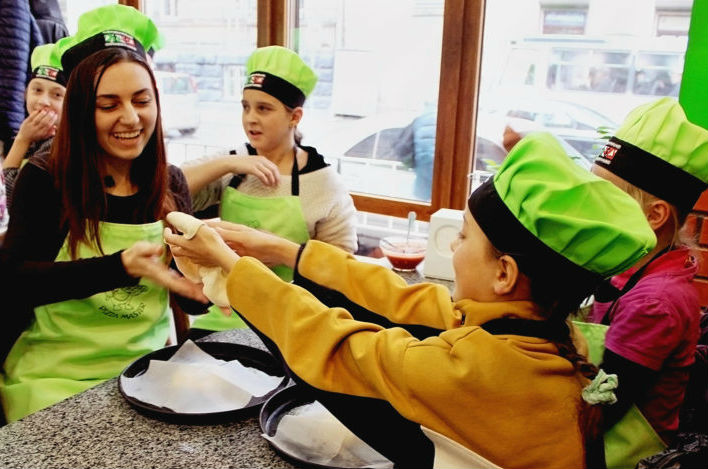 I am convinced that the Revolution of Dignity has taught us a powerful lesson, one that is captured by the saying, “A free society is a moral achievement.” The same idea is profoundly elaborated on in Rabbi Lord Jonathan Sacks’ acceptance speech as the 2016 winner of the Templeton Prize.
I am convinced that the Revolution of Dignity has taught us a powerful lesson, one that is captured by the saying, “A free society is a moral achievement.” The same idea is profoundly elaborated on in Rabbi Lord Jonathan Sacks’ acceptance speech as the 2016 winner of the Templeton Prize.
With these ideas in mind, I strongly argue in favor of education, which is associated with moral achievement and is critical in preparing us for freedom. Education should enable and inspire us to create and live in a free society, and should be a priority on our global affairs’ agenda.
Totalitarian regimes purposefully mistreat and subdue education, especially a liberal education. Soviet education played a crucial role in promoting the system’s values and developing attitudes that allowed a new generation to easily blend with the existing mindset.
In his speech, Sacks reflects on the concept of “outsourcing morality,” which he thinks has defined the thinking and behavior of this era.
The idea of outsourcing freedom is an extremely risky and potentially damaging endeavor. The market itself isn’t the source of a free society, nor is the state, nor is technology. The moment we convince ourselves that creating and sustaining a free society can be outsourced, we are in a kind of trouble that could take generations to overcome. It’s highly unlikely that we can meaningfully and successfully outsource the function of sustaining liberty to someone or something other than ourselves.
This is where my hope for the future resides: as long as we do not consider outsourcing freedom but think of attaining freedom as our primary goal—one that is worthy of educating ourselves, working creatively, and caring for others generously—we are taking the right attitude toward the future. It is true that our daily business of thinking, making decisions, acting, voting, raising children, and running businesses might not always resonate with what we think the right attitude should be. And this is all right, because freedom is about free men trying and failing and trying again to win their freedom. This is why Sacks reminds us that a free society is a moral achievement.
It’s important to realize that moral achievements are not transferable in the way that many other things and goods can be. We might own buildings, land, and other assets that we inherited from our predecessors, but I can’t inherit the moral achievements of my predecessors in the same way. I may admire them and they might be inspirational for me, but I can’t confer someone else’s moral achievements upon myself.

Ukrainian Catholic University students participate in “Theater of the East,” which is a student theater group that puts on Christmas performances in seven or eight cities in eastern Ukraine for troops. Credit: Ukrainian Catholic University

This is why a liberal society is always a challenging goal for any generation. It is true that previous generations might provide us with social capital that facilitate or hinder our ability to achieve liberty. Already-established policies and procedures, patterns of political life, the quality of the public square, as well as the vitality of civil society are all important embodiments of the social capital accumulated by previous generations. Education certainly belongs to this list as one of the most important tools that can enable, shape, and serve our aspirations for freedom—but it could also prepare and orient us toward an outsourcing mentality backed up by consumer attitudes.
I ask myself time and again: how can we transition from the Revolution of Dignity to education of dignity? My intuition is that revolution is something that might set you on the right track, but it’s probably not the optimal mode for daily living. This is where education comes in as a much more favorable way of nourishing oneself. What then should be the ultimate outcome of education of dignity, and what would be the best way to express it?
In his April TED talk, Pope Francis expressed ideas that powerfully resonate with the conclusions we are drawing from the Revolution of Dignity. His call for a revolution of tenderness is rooted in advocating for and promoting the idea of solidarity. Solidarity, says Pope Francis, should become the default attitude if we are hoping for a better future. Attitudes, as we know, are largely the offspring of education. So the idea of education of dignity is thoughtfully unfolding with the Pope’s emphasis on solidarity as both an internalized principle of approaching the world and as a way of interacting with others.
Solidarity is a useless concept if it doesn’t grow out of our ability to appreciate the dignity of others. Thus, the Pope emphasizes that solidarity “is not an automatic mechanism. It cannot be programmed or controlled. It is a free response born from the heart of each and every one.” Being able to respond freely articulates the essence of responsibility. Responsibility is a way of relating to outside realities; it is how we respond as free persons to challenges, obligations, tragedies, other people, and ultimately, God.
This is why a liberal education is so crucial to having a better, more just, and more humane life. But there can be no education of dignity if there is no dignified management underneath it. The Ukrainian Catholic University management style is built around the concepts of subsidiarity, sustainability, and solidarity. These principles also play a constitutive role in shaping the university ethos in general.
This is our way of introducing the concept of education of dignity. Will it trigger a “revolution of tenderness”? I think there are good reasons to be optimistic.
Volodymyr Turchynovskyy is Dean of Faculty of Social Sciences at the Ukrainian Catholic University in Lviv, Ukraine. This article is an abridged version of a longer speech he gave at the Catholic University of Croatia, Zagreb, in May 2017.
Image: Students from Ukrainian Catholic University make pizzas with children from a local orphanage in Lviv. Credit: Ukrainian Catholic University
